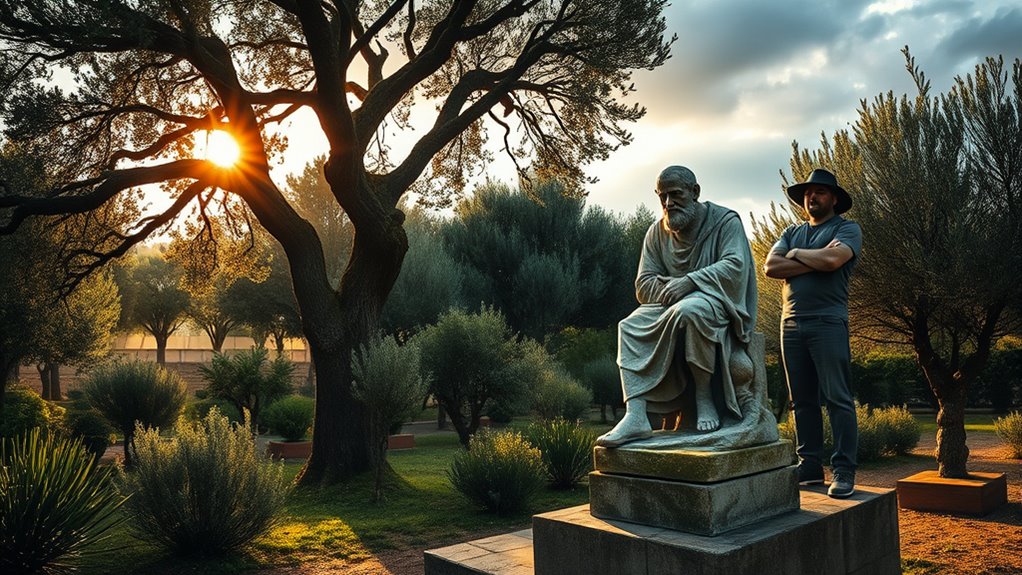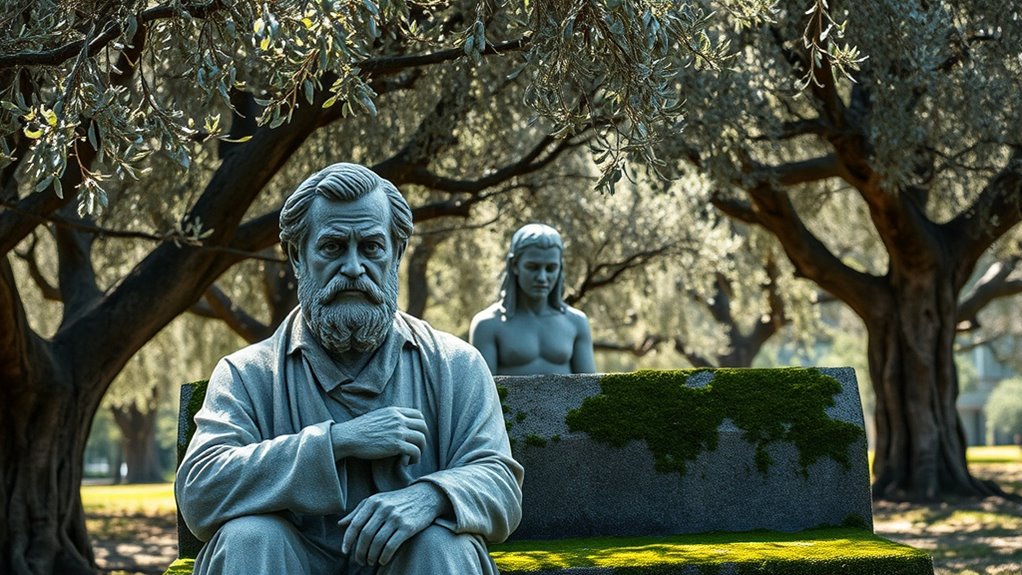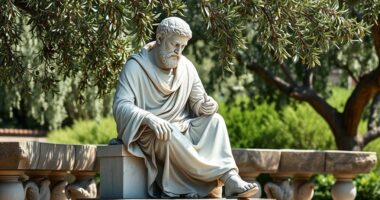Discover how Stoicism and Cynicism, rooted in ancient Greece, offer contrasting paths to virtue and inner peace. Cynics reject societal norms and material possessions, seeking freedom through austerity and self-sufficiency, while Stoics accept external events and focus on rational acceptance and active societal participation. Both emphasize resilience and virtue but differ in lifestyle and attitude toward life’s challenges. Exploring these philosophies further can reveal timeless insights into living authentically and resiliently.
Key Takeaways
- Cynicism emphasizes living simply, rejecting societal norms, and pursuing self-sufficiency through provocative acts, contrasting with Stoicism’s focus on social participation and acceptance.
- Both philosophies value virtue as the highest good but differ in their approach: Cynics seek detachment from external possessions, while Stoics accept external events with rational resilience.
- Cynicism promotes austerity and moral absolutism, often leading to social alienation, whereas Stoicism encourages engagement with society to cultivate inner tranquility.
- Modern applications of Stoicism include mindfulness and resilience practices, aligning with their ancient goal of achieving inner peace amidst external chaos.
- Understanding these philosophies reveals different paths to inner freedom: Cynicism through radical detachment, Stoicism through rational acceptance and moral integrity.
Origins and Historical Roots

Have you ever wondered where Cynicism originates and how it developed over time? Ancient debates and historical influences shaped its core ideas. It traces back to Socrates, whose emphasis on virtue and living authentically inspired early thinkers. Diogenes of Sinope, around 380 BC, founded Cynicism, challenging social norms through provocative acts. The movement emerged as a response to societal corruption and decadence, emphasizing living simply and in accordance with nature. Its outsider stance contrasted with other philosophies. Over time, Cynicism influenced Stoicism and declined due to its disruptive nature, but its roots in ancient debates about virtue remain integral to its legacy. Additionally, the emphasis on living authentically and questioning societal values continues to resonate in modern philosophical discussions. Furthermore, Cynicism’s emphasis on challenging social norms contributed significantly to its lasting impact on ethical and social thought. The philosophy’s focus on disregarding material wealth exemplifies its rejection of superficial values and remains relevant in contemporary discussions on authenticity and integrity.
Distinct Attitudes Toward Society and Norms

Cynicism and Stoicism, though both rooted in ancient Greek thought, adopt markedly different attitudes toward society and its norms. As a Cynic, you reject social conformity, often engaging in societal rejection to challenge artificial standards. You see societal rules as barriers to living naturally and freely, embracing poverty and austerity to distance yourself from civilization’s constraints. In contrast, Stoics accept social norms as part of nature and participate actively in society. They believe virtue includes respecting laws and customs, using rational responses to navigate societal expectations. Your attitude shapes your approach: Cynics defy norms outright, while Stoics harmonize with them to maintain inner peace. Moreover, some Stoics utilize customary practices as tools to cultivate virtue and resilience within societal frameworks.
Lifestyle and Practical Practices

How do these philosophies translate into daily life? For Cynics, it means rejecting material possessions, living simply, and challenging societal norms through provocative public conduct. You might see a Cynic eating in marketplaces or spitting in public to question conventions. For Stoics, it involves practicing rational discipline, accepting external circumstances, and maintaining virtue. You’d focus on mental resilience, controlling desires, and respecting social norms, even amid challenges. Practical practices include:
- Minimizing material possessions
- Engaging in mindful public conduct
- Practicing self-discipline
- Accepting external events
- Cultivating inner contentment
- Incorporating sleep strategies to improve overall well-being and resilience in daily routines. Additionally, adopting mindful routines can enhance mental clarity and emotional stability, aligning with these philosophical principles. Developing a self-awareness mindset is also essential to recognize and manage emotional reactions effectively, especially considering the influence of textile art techniques on relaxing the mind and fostering introspection. A deeper understanding of merchant services and risks associated with modern financial systems can further support a balanced approach to daily challenges and decision-making.
Perspectives on Happiness and Desires

Both Cynics and Stoics see happiness as an internal state rooted in virtue, but they approach desires differently. Cynics believe material possessions only create dependence and stress, so they practice emotional detachment by rejecting unnecessary goods altogether. They seek happiness through self-sufficiency and minimalism, viewing external things as distractions. Their philosophy emphasizes the importance of authenticity and self-awareness in reducing suffering. In addition, their focus on simplicity helps diminish material dependence, fostering resilience and inner peace. They also recognize that cultivating mindfulness can enhance their ability to remain detached from external circumstances, leading to greater tranquility. Furthermore, embracing water-based practices, such as aquatic exercises or hydrotherapy, can promote physical and mental well-being, aligning with their pursuit of harmony with nature. Stoics accept that some desires, like health or social status, are natural and indifferent, but they focus on controlling their perceptions and limiting attachment to external goods. Happiness, for both schools, comes from within—by mastering desires and avoiding dependence on material possessions, you cultivate inner peace and resilience. Additionally, cultivating biodiversity in one’s environment—such as planting native species or creating habitats—can foster a deeper connection to nature, supporting mental well-being and inner harmony.
Core Ethical Principles and Virtue

At the heart of these philosophies lies a commitment to virtue as the highest good, guiding ethical behavior and shaping how you live your life. Both schools emphasize virtue cultivation, but differ in their moral outlooks: Cynics adopt moral absolutism, rejecting societal norms that conflict with natural virtue, while Stoics see virtue as living in harmony with nature and reason. To embody this, you should:
- Prioritize inner moral integrity
- Reject superficial pleasures and societal pretenses
- Live simply and authentically
- Accept external events with rational calm
- Pursue self-sufficiency and independence
Impact and Influence Through the Ages

The influence of Cynicism and Stoicism extends far beyond their origins, shaping philosophical thought and practical life across different eras. You can see their urban influence in style, ethics, and resilience, inspiring movements from medieval times to modern self-help. Their philosophical adaptations include Stoic resilience in leadership and Cynic rejection of societal norms. These schools impacted art, politics, and personal discipline, making their ideas relevant today. Recognizing their impact on cultural intelligence highlights how ancient principles of self-control and resilience can inform contemporary approaches to personal and societal well-being. Additionally, the development of electric-powered mobility demonstrates how innovation continues to reshape our understanding of resilience and adaptability in modern society. Furthermore, examining their philosophical concepts provides insight into mental toughness and how it can be cultivated in today’s fast-paced world. The enduring relevance of their ideas also underscores the importance of philosophical adaptability in navigating modern challenges.
Practical Applications in Modern Life

In today’s fast-paced world, applying Stoic principles can help you build resilience and maintain inner peace amid chaos. Embrace contemporary mindfulness by staying present and observing your thoughts without judgment. Practice modern minimalism by decluttering your environment and focusing on what truly matters. Use mental discipline to accept external events beyond your control. Cultivate gratitude for what you have, rather than yearning for more. Reflect daily on your values and avoid distractions that hinder clarity. These practices foster internal strength, reduce stress, and help you navigate life’s challenges with calm and purpose. Acknowledging the importance of regional bank hours can further enhance your ability to respond thoughtfully rather than react impulsively.
Comparing Philosophical Goals and End Results

While both Cynicism and Stoicism aim for a virtuous life, their goals diverge in how they envision achieving and experiencing ultimate well-being. Cynicism seeks emotional resilience through complete material detachment, often rejecting societal norms and external possessions to live in harmony with nature. Their end result is inner freedom from desires and external chaos, even if it means social alienation. Stoicism, however, emphasizes living virtuously within society, cultivating emotional resilience by accepting external circumstances and controlling perceptions. Their goal is inner tranquility and moral integrity, balancing engagement with societal roles and detachment from unnecessary desires, ultimately fostering resilience and serenity amid life’s challenges.
Frequently Asked Questions
How Did Cynicism Influence Modern Minimalist Lifestyles?
You see, cynicism’s influence on modern minimalist lifestyles is clear. Its emphasis on living simply, rejecting material excess, and questioning societal norms fuels your minimalist mindset. Modern skepticism about consumer culture echoes cynics’ disdain for artificial pleasures and excess possessions. By embracing minimalism, you follow in their footsteps, prioritizing internal contentment over external riches and challenging societal values, just like the cynics did centuries ago to live authentically.
What Are Common Misconceptions About Cynic and Stoic Practices?
Many misconception myths surround cynic and stoic practices, leading to practice misunderstandings. People often think cynics constantly live in public indecency or reject all social norms, but their goal is simple living and philosophical challenge. Similarly, some believe stoics suppress emotions entirely, when they actually practice rational acceptance and emotional resilience. Clarifying these practices helps you see that both schools focus on internal virtue, not extremism or emotional suppression.
Can Cynicism and Stoicism Be Integrated in Daily Life?
Think of blending cynicism and stoicism as crafting a symphony from contrasting melodies. You can apply practical daily applications by embracing stoic resilience and rational acceptance, while also practicing cynic boldness in challenging societal norms. This philosophical integration helps you stay grounded yet fiercely independent, fostering inner contentment and outward authenticity. Combining these philosophies offers a balanced approach—question societal illusions while cultivating inner virtue—creating a resilient, authentic life symphony.
How Do These Philosophies Address Emotional Resilience?
You can build emotional resilience by combining Cynicism and Stoicism. Cynicism teaches you emotional control through detachment from external possessions and societal norms, reducing stress. Stoicism sharpens your mental toughness by practicing rational perception, accepting what’s out of your control, and focusing on virtue. Together, these philosophies help you develop inner strength, manage your emotions better, and face life’s challenges with calmness and resilience.
Are There Notable Historical Figures Who Embodied Both Schools?
You might find it fascinating that some historical figures embody a philosophical duality, blending aspects of both schools. Diogenes exemplifies Cynicism with his radical rejection of social norms, while Epictetus embodies Stoicism through his focus on rational resilience within society. These figures show that, despite differing ideals, individuals can integrate diverse philosophies, highlighting the complex interplay of thought and action across history’s notable personalities.
Conclusion
By understanding both Stoicism and Cynicism, you can choose how to navigate life’s challenges with resilience or radical authenticity. Whether you embrace the calm of rational discipline or challenge societal norms like a true rebel, these philosophies offer timeless guidance. Remember, in your quest for virtue and happiness, you’re channeling ancient wisdom—like a philosopher with a smartphone—proving that timeless ideas still shape your modern journey toward meaning and freedom.









